The_Imperial_Examination_System 中国科举制度 中英文双语
科举制度考试内容
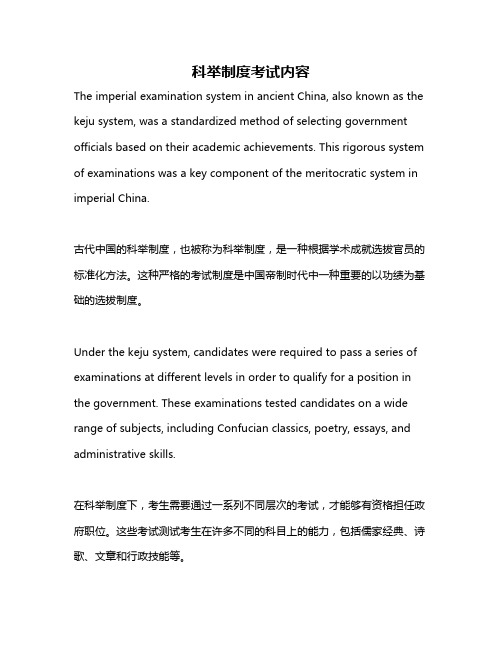
科举制度考试内容The imperial examination system in ancient China, also known as the keju system, was a standardized method of selecting government officials based on their academic achievements. This rigorous system of examinations was a key component of the meritocratic system in imperial China.古代中国的科举制度,也被称为科举制度,是一种根据学术成就选拔官员的标准化方法。
这种严格的考试制度是中国帝制时代中一种重要的以功绩为基础的选拔制度。
Under the keju system, candidates were required to pass a series of examinations at different levels in order to qualify for a position in the government. These examinations tested candidates on a wide range of subjects, including Confucian classics, poetry, essays, and administrative skills.在科举制度下,考生需要通过一系列不同层次的考试,才能够有资格担任政府职位。
这些考试测试考生在许多不同的科目上的能力,包括儒家经典、诗歌、文章和行政技能等。
One of the key features of the keju system was its focus on meritocracy, where individuals were selected for government positions based on their ability and talent rather than their family background or social status. This allowed individuals from all walks of life to have the opportunity to advance in society based on their intellectual capabilities.科举制度的一个关键特点是它着重于以功绩为基础的原则,即个人能力和才华胜任政府职位的被选拔标准,而不是他们的家庭背景或社会地位。
有关科举制的话题作文
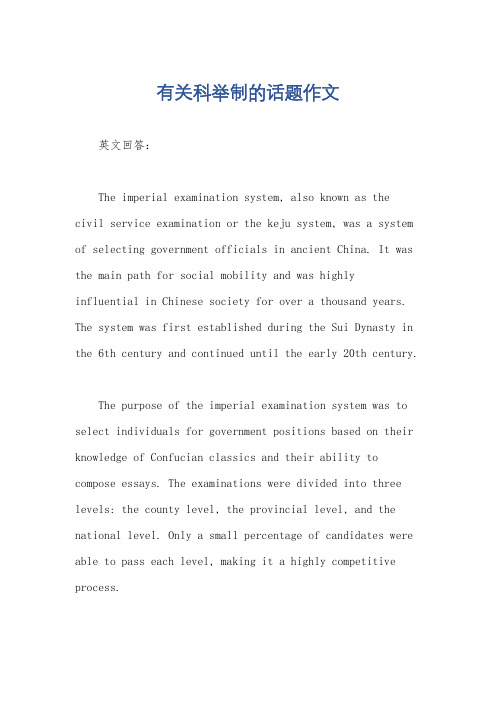
有关科举制的话题作文英文回答:The imperial examination system, also known as thecivil service examination or the keju system, was a system of selecting government officials in ancient China. It was the main path for social mobility and was highlyinfluential in Chinese society for over a thousand years. The system was first established during the Sui Dynasty in the 6th century and continued until the early 20th century.The purpose of the imperial examination system was to select individuals for government positions based on their knowledge of Confucian classics and their ability to compose essays. The examinations were divided into three levels: the county level, the provincial level, and the national level. Only a small percentage of candidates were able to pass each level, making it a highly competitive process.The imperial examination system had both advantages and disadvantages. On one hand, it provided an equal opportunity for individuals from all social classes to pursue a career in government. It allowed talented individuals to rise through the ranks and serve the emperor and the nation. This merit-based system was seen as a fair and just way of selecting officials.On the other hand, the imperial examination system placed a heavy emphasis on rote memorization and adherence to orthodox Confucianism. This limited the diversity of ideas and stifled creativity. The system also favored individuals from wealthy and privileged backgrounds who had access to education and resources. As a result, it perpetuated social inequality and hindered social progress.中文回答:科举制度,又称为文试或者科举制度,是中国古代选拔政府官员的一种制度。
英语四级翻译真题-科举制
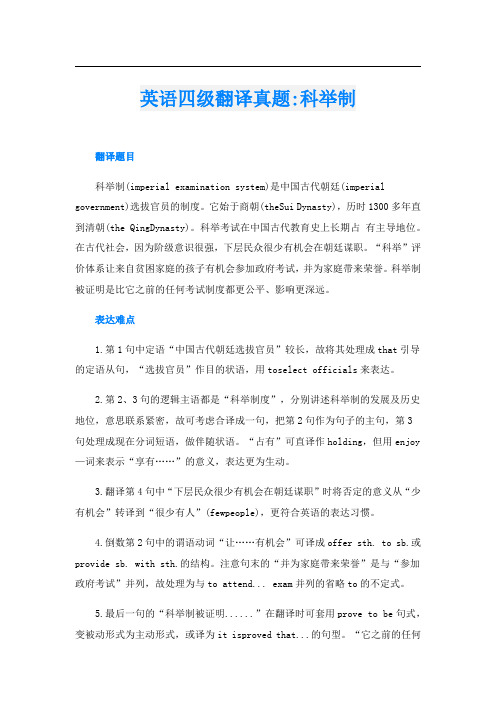
英语四级翻译真题:科举制翻译题目科举制(imperial examination system)是中国古代朝廷(imperial government)选拔官员的制度。
它始于商朝(theSui Dynasty),历时1300多年直到清朝(the QingDynasty)。
科举考试在中国古代教育史上长期占有主导地位。
在古代社会,因为阶级意识很强,下层民众很少有机会在朝廷谋职。
“科举”评价体系让来自贫困家庭的孩子有机会参加政府考试,并为家庭带来荣誉。
科举制被证明是比它之前的任何考试制度都更公平、影响更深远。
表达难点1.第1句中定语“中国古代朝廷选拔官员”较长,故将其处理成that引导的定语从句,“选拔官员”作目的状语,用toselect officials来表达。
2.第2、3句的逻辑主语都是“科举制度”,分别讲述科举制的发展及历史地位,意思联系紧密,故可考虑合译成一句,把第2句作为句子的主句,第3句处理成现在分词短语,做伴随状语。
“占有”可直译作holding,但用enjoy —词来表示“享有……”的意义,表达更为生动。
3.翻译第4句中“下层民众很少有机会在朝廷谋职”时将否定的意义从“少有机会”转译到“很少有人”(fewpeople),更符合英语的表达习惯。
4.倒数第2句中的谓语动词“让……有机会”可译成offer sth. to sb.或provide sb. with sth.的结构。
注意句末的“并为家庭带来荣誉”是与“参加政府考试”并列,故处理为与to attend... exam并列的省略to的不定式。
5.最后一句的“科举制被证明......”在翻译时可套用prove to be句式,变被动形式为主动形式,或译为it isproved that...的句型。
“它之前的任何考试制度”可直译为any other previous examination system或将“它之前的”处理成“考试制度”的后置定语existing before it。
科举英文详细介绍
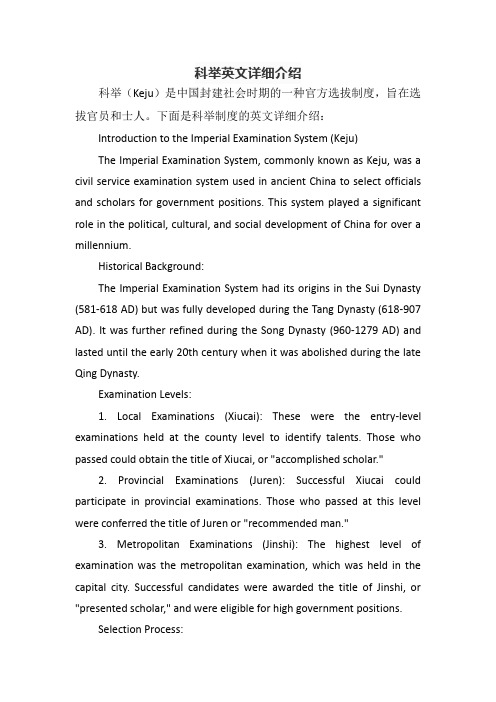
科举英文详细介绍科举(Keju)是中国封建社会时期的一种官方选拔制度,旨在选拔官员和士人。
下面是科举制度的英文详细介绍:Introduction to the Imperial Examination System (Keju)The Imperial Examination System, commonly known as Keju, was a civil service examination system used in ancient China to select officials and scholars for government positions. This system played a significant role in the political, cultural, and social development of China for over a millennium.Historical Background:The Imperial Examination System had its origins in the Sui Dynasty (581-618 AD) but was fully developed during the Tang Dynasty (618-907 AD). It was further refined during the Song Dynasty (960-1279 AD) and lasted until the early 20th century when it was abolished during the late Qing Dynasty.Examination Levels:1. Local Examinations (Xiucai): These were the entry-level examinations held at the county level to identify talents. Those who passed could obtain the title of Xiucai, or "accomplished scholar."2. Provincial Examinations (Juren): Successful Xiucai could participate in provincial examinations. Those who passed at this level were conferred the title of Juren or "recommended man."3. Metropolitan Examinations (Jinshi): The highest level of examination was the metropolitan examination, which was held in the capital city. Successful candidates were awarded the title of Jinshi, or "presented scholar," and were eligible for high government positions.Selection Process:The Imperial Examination System was based on Confucian principles and emphasized knowledge of the Confucian classics. The examinations were highly competitive and required years of rigorous study. Success in these exams offered an opportunity for social mobility and access to prestigious government positions.Impact on Chinese Society:The Keju system had a profound influence on Chinese society and culture. It promoted Confucianism and encouraged education, as aspiring scholars dedicated themselves to rigorous studies. The system also had a stabilizing effect on Chinese society by providing a means for talented individuals from lower social classes to attain positions of influence.Abolition:The Imperial Examination System was abolished in the early 20th century as part of the extensive reforms of the late Qing Dynasty and the subsequent establishment of the Republic of China. The abolition of the system marked a significant turning point in Chinese history, leading to the modernization of education and governance.The Imperial Examination System, or Keju, remains a prominent aspect of Chinese history and serves as a testament to the importance of education and meritocracy in ancient China.。
关于科举的作文800字左右
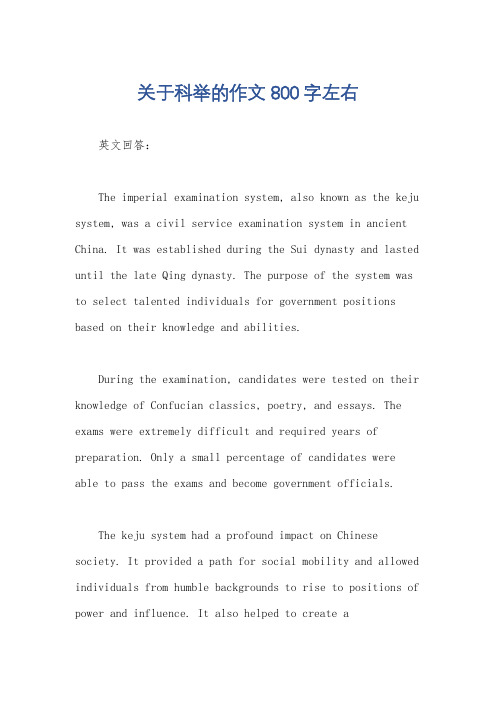
关于科举的作文800字左右英文回答:The imperial examination system, also known as the keju system, was a civil service examination system in ancient China. It was established during the Sui dynasty and lasted until the late Qing dynasty. The purpose of the system was to select talented individuals for government positions based on their knowledge and abilities.During the examination, candidates were tested on their knowledge of Confucian classics, poetry, and essays. The exams were extremely difficult and required years of preparation. Only a small percentage of candidates were able to pass the exams and become government officials.The keju system had a profound impact on Chinese society. It provided a path for social mobility and allowed individuals from humble backgrounds to rise to positions of power and influence. It also helped to create ameritocratic society, where individuals were rewarded based on their abilities rather than their social status.However, the keju system also had its drawbacks. It placed a heavy emphasis on rote memorization and regurgitation of knowledge, rather than critical thinking and creativity. This led to a narrow focus on Confucianism and a neglect of other areas of knowledge and expertise.中文回答:科举制度,又称科举考试制度,是中国古代的一种文职考试制度。
The-Imperial-Examination-System-中国科举制度-中英文双语
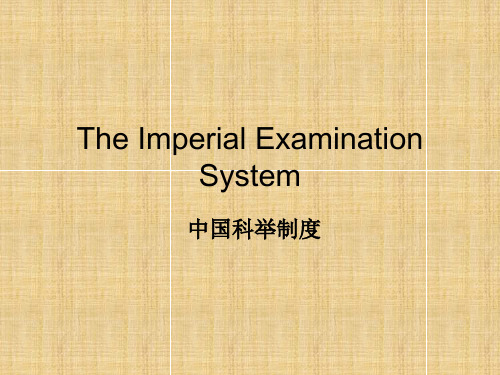
Juren The Provincial Examination
省试
Xiucai
The County Examination 乡试
Tongsheng
Zhuangyuan
Bangyan
Tanhua
Jinshi
Jinshi
Influence Advantages
• To the government • To the administrative officials • To the grassroots
再见
Emperor Taizong
The Four BookS
The Great Learning The Doctrine of the Mean The Analects of Confucius Mencius
the Five Classics
Eight – legged essay
→ → Opening
• 隋朝以后,国家逐渐确立以科举考试选拔 官员,私学开始衰败,调整为以应举(科 举考试)为目的。
Origin ※ To replace the Nine Rank Judging
System (九品中正制) ※ To select real talents
Emperor Yang of Sui
Empexamination System
中国科举制度
Imperial Examination System 科举考试制度
• After the Sui Dynasty, these private and official schools had gradually deteriorated (衰败) into a dependency on the imperial examination system (科 举考试制度), through which officials were selected.
科举制度的意义英语作文
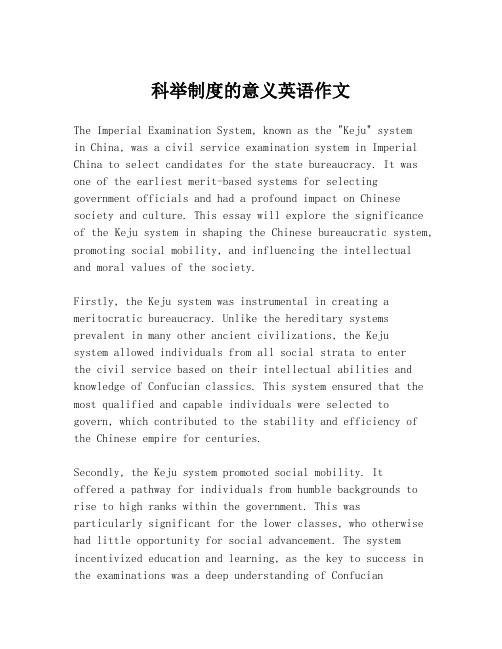
科举制度的意义英语作文The Imperial Examination System, known as the "Keju" systemin China, was a civil service examination system in Imperial China to select candidates for the state bureaucracy. It was one of the earliest merit-based systems for selecting government officials and had a profound impact on Chinese society and culture. This essay will explore the significance of the Keju system in shaping the Chinese bureaucratic system, promoting social mobility, and influencing the intellectual and moral values of the society.Firstly, the Keju system was instrumental in creating a meritocratic bureaucracy. Unlike the hereditary systems prevalent in many other ancient civilizations, the Kejusystem allowed individuals from all social strata to enterthe civil service based on their intellectual abilities and knowledge of Confucian classics. This system ensured that the most qualified and capable individuals were selected to govern, which contributed to the stability and efficiency of the Chinese empire for centuries.Secondly, the Keju system promoted social mobility. Itoffered a pathway for individuals from humble backgrounds to rise to high ranks within the government. This wasparticularly significant for the lower classes, who otherwise had little opportunity for social advancement. The system incentivized education and learning, as the key to success in the examinations was a deep understanding of Confucianphilosophy and literature.Thirdly, the Keju system had a profound effect on the intellectual and moral values of Chinese society. The examinations were designed to test not only the candidates' knowledge but also their moral character and judgment. This emphasis on moral integrity and ethical behavior helped to shape a society that valued virtue and righteousness. The system also fostered a culture of scholarship and respect for education, as success in the examinations was seen as a markof honor and prestige.Moreover, the Keju system had a lasting impact on the Chinese literary and cultural traditions. The examination questions often required candidates to write essays and poems, which contributed to the development of Chinese literature. The system also encouraged the standardization of written Chinese, as candidates needed to be proficient in classical Chinese to succeed in the exams.In conclusion, the Imperial Examination System was a pivotal institution in Chinese history. It represented asophisticated mechanism for selecting government officials based on merit rather than birthright, which was a radical departure from the norms of the time. The system's legacy can be seen in the continued importance of education and thecivil service in modern China, as well as in the enduring influence of Confucian values on Chinese society. The Keju system's emphasis on meritocracy, social mobility, and moral integrity continues to resonate and inspire systems of governance and education around the world.。
大学英语综合教程3课后翻译答案(精美版)
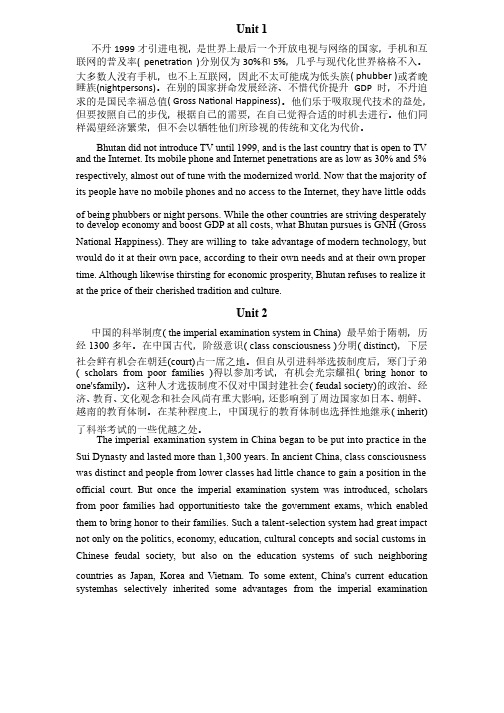
Unit 1不丹1999才引进电视,是世界上最后一个开放电视与网络的国家,手机和互联网的普及率( penetra on )分别仅为30%和5%,几乎与现代化世界格格不入。
大多数人没有手机,也不上互联网,因此不太可能成为低头族( phubber )或者晚睡族(nightpersons)。
在别的国家拼命发展经济、不惜代价提升GDP 时,不丹追求的是国民幸福总值( Gross Na onal Happiness)。
他们乐于吸取现代技术的益处,但要按照自己的步伐,但要按照自己的步伐,根据自己的需要,根据自己的需要,根据自己的需要,在自已觉得合适的时机去进行。
在自已觉得合适的时机去进行。
在自已觉得合适的时机去进行。
他们同他们同样渴望经济繁荣,但不会以牺牲他们所珍视的传统和文化为代价。
样渴望经济繁荣,但不会以牺牲他们所珍视的传统和文化为代价。
Bhutan did not introduce TV until 1999, and is the last country that is open to TV and the Internet. Its mobile phone and Internet penetrations are as low as 30% and 5% respectively, almost out of tune with the modernized world. Now that the majority of its people have no mobile phones and no access to the Internet, they have little odds of being phubbers or night persons. While the other countries are striving desperately to develop economy and boost GDP at all costs, what Bhutan pursues is GNH (Gross National Happiness). They are willing to take advantage of modern technology, but would do it at their own pace, according to their own needs and at their own proper time. Although likewise thirsting for economic prosperity, Bhutan refuses to realize it at the price of their cherished tradition and culture.Unit 2中国的科举制度( the imperial examination system in China) 最早始于隋朝,历经1300多年。
科举制度简介
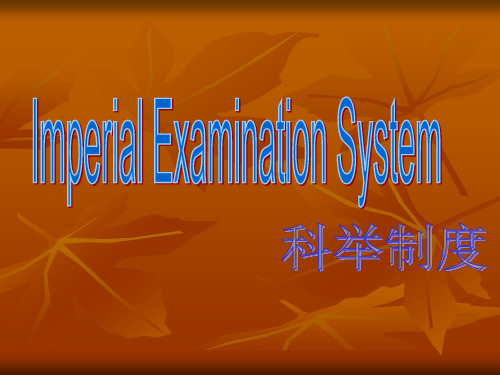
宋朝时期
❖ 宋朝是中国古代科举制度的改革时期。 ❖ 宋朝的科举制度与唐朝相比,有着显著的发展。 ❖ 第一,宋代的科举放宽了录取和任用的范围。第二,
宋代确立了三年一次的三级考试制度,由皇帝亲自 殿试考选,考生一律成为天子的门生,避免考生与 主考官之间以师生为名结成同党。第三,从宋代开 始,科举正式开始实行糊名和誊录,并建立防止徇 私的新制度。
❖ 明清实行八股取士,从内容到形式严重束缚应考者,使许多 知识分子不讲求实际学问,束缚了知识分子的思想;八股取 士所带来的脱离实际的学风,对学术文化的发展产生了极为 消极的影响;清末科举制度严重阻碍了科学文化的发展,是 导致近代中国自然科学落后的重要原因之一;科举制度不利 于知识创新,更不利于创新人才的培养。
“证状的0举 中,元休0制
科举博物馆中的状元厅、进士厅。 科举匾额博物馆 状元阁
The "rags to riches" stories of the IES winners imbued the Chinese nation with the idea of "All pursuits are of low values; only studying books is high“
科举制度是唐朝开始正式实行的,经历了一千三 百多年,一直紧紧伴随着中华文明史,结束于清 朝光绪二十七年最后一科进士考试。中国古代科 举制度经历着几个时期
Generally, the year of 605 has been accepted as the beginning of IES when Emperor Yang of the Sui Dynasty decreed that the program of jinshi be introduced into the examinations in his Reign of Daye. IES lasted for 1300 years, from its founding in 605 to its abolition by Emperor Guangxu of the Qing Dynasty in 1905.
科举考试体系 - 译本
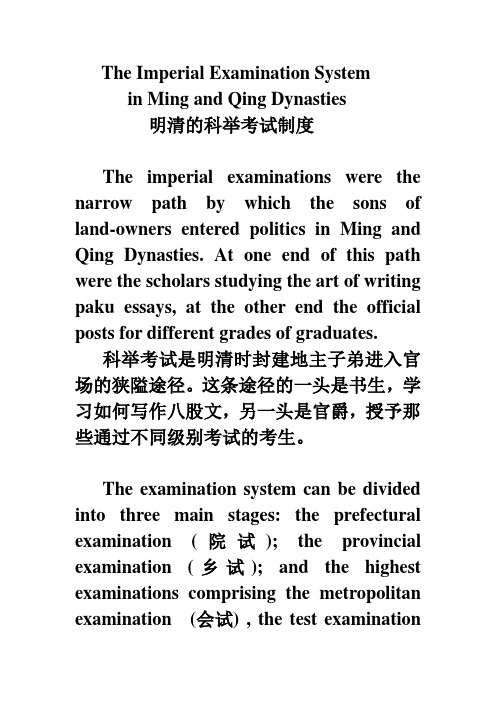
The Imperial Examination Systemin Ming and Qing Dynasties明清的科举考试制度The imperial examinations were the narrow path by which the sons of land-owners entered politics in Ming and Qing Dynasties. At one end of this path were the scholars studying the art of writing paku essays, at the other end the official posts for different grades of graduates.科举考试是明清时封建地主子弟进入官场的狭隘途径。
这条途径的一头是书生,学习如何写作八股文,另一头是官爵,授予那些通过不同级别考试的考生。
The examination system can be divided into three main stages: the prefectural examination (院试); the provincial examination (乡试); and the highest examinations comprising the metropolitan examination (会试) , the test examination(复试) and the palace examination (殿试) , as well as final test at the imperial court.科举考试主要分三个阶段:院试、乡试以及最高级别的会试、复试、殿试以及最后的朝考。
The prefectural examination was preceded by two preliminary tests, the first being the county test ( 县试), presided over by the local magistrate. After passing this, candidates took another test at the prefecture (府试) , presided over by the prefect; and those who reached the required standard were called pupils (童生) . The prefect then sent the list of students to the prefectural college where the prefectural examination was held, and students who passed this were called licentiates (秀才) . The commissioner of studies (学道) who was in charge of this examination held office for three years, during which he had to go to each prefecture under hisjurisdiction in turn to hold two examinations.院试之前有两种考试,第一种是县试,由知县主持。
科举制英语作文

科举制英语作文The imperial examination system, also known as the civil service examination or keju, was a system in ancient China where individuals were selected for government positions based on their performance in a series of written examinations. This system was used for over 1,300 years, from the Sui dynasty to the Qing dynasty.The imperial examination system was established to ensure that individuals chosen for government positions were selected based on merit and knowledge rather than family background or wealth. It was designed to provide equal opportunities for all individuals regardless of their social status.Candidates for the imperial examinations were requiredto study a wide range of subjects, including Confucian classics, history, poetry, and law. The examinations were extremely competitive, with only a small percentage of candidates passing each year.Successful candidates who passed the imperial examinations were awarded prestigious positions in thegovernment bureaucracy, which provided them with wealth, power, and social status. This system helped to create a highly educated and skilled ruling class in China.Overall, the imperial examination system played a significant role in shaping Chinese society and government for over a millennium. It promoted meritocracy and provided opportunities for social mobility, allowing individualsfrom all backgrounds to pursue a career in governmentservice based on their abilities.科举制度,也称为中国科举考试或科举制度,是古代中国的一种选拔官员的体制,根据候选人在一系列笔试中的表现来选拔官员。
中国科举制度英文版
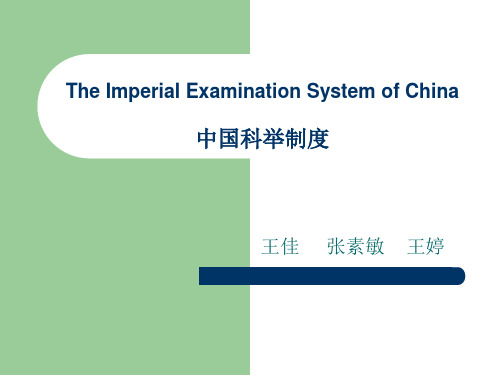
隋朝时期
隋朝是中国古代科举制度的起源。 隋朝统一全国之后,为了适应封建经济和政治 关系的发展变化,为了加强中央集权制度,用 科举制度代替以前的九品中正制。
唐朝时期
唐朝是中国古代科举制度完备时期。 在唐代,考试科目分为常科和制科两类。 武则天时首创武举和殿试。
宋朝时期
宋朝是中国古代科举制度的改革时期。 放宽录取和任用范围;由皇帝亲自殿试选考; 正式开始实行糊名和誉录,并建立防止徇私的 新制度
The Imperial Examination System of China
中国科举制度
王佳
张素敏
王婷
主要内容
前言 一、科举制度的创立及发展 二、科举制度的考试流程 三、科举制度的考试内容 四、科举制度的影响 结语
前言
相当重要
独立创造 历时长久 影响深广
不了解科举制度,就不能说真正了解中国的历和中国文化
二、 科举制度的考试流程(以清代为主)
进士
贡士
举人
殿试
会试 乡试
童试:县试、府试、院试
秀才
(一)童试
童试,一般又叫做 “小考”。凡童子 开始应初试的时候 称做“童生”,童 生经过一定的考试 选拔,在县里面选 拔了以后到督学进 行考试,督学考试 合格就可以称做 “秀才”了。
(二)乡试
乡试每三年举行一次,八月份。乡试考中了以后就 称为举人,中举以后,照例要报喜。报喜的人叫 报子,头上顶着红缨帽子,骑着马,敲着锣,带 着报条,到中举的人家门口去张贴。报条上写着: 喜报 贵府老爷×××应本科×处乡试高中 第×名举人 报喜人×××
四、科举制度的影响
中国科举制的英文演讲稿
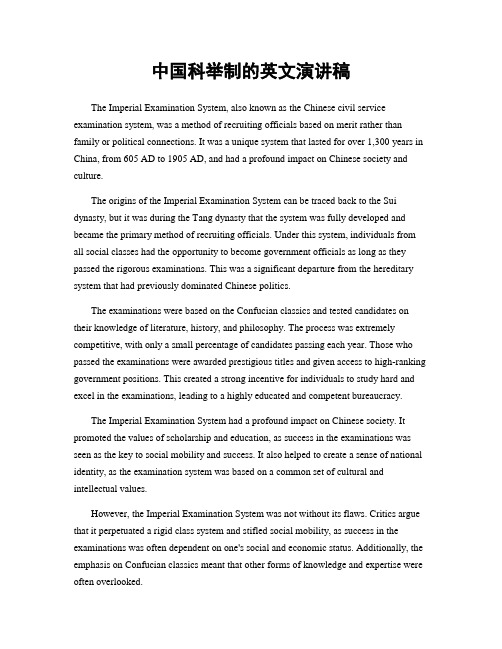
中国科举制的英文演讲稿The Imperial Examination System, also known as the Chinese civil service examination system, was a method of recruiting officials based on merit rather than family or political connections. It was a unique system that lasted for over 1,300 years in China, from 605 AD to 1905 AD, and had a profound impact on Chinese society and culture.The origins of the Imperial Examination System can be traced back to the Sui dynasty, but it was during the Tang dynasty that the system was fully developed and became the primary method of recruiting officials. Under this system, individuals from all social classes had the opportunity to become government officials as long as they passed the rigorous examinations. This was a significant departure from the hereditary system that had previously dominated Chinese politics.The examinations were based on the Confucian classics and tested candidates on their knowledge of literature, history, and philosophy. The process was extremely competitive, with only a small percentage of candidates passing each year. Those who passed the examinations were awarded prestigious titles and given access to high-ranking government positions. This created a strong incentive for individuals to study hard and excel in the examinations, leading to a highly educated and competent bureaucracy.The Imperial Examination System had a profound impact on Chinese society. It promoted the values of scholarship and education, as success in the examinations was seen as the key to social mobility and success. It also helped to create a sense of national identity, as the examination system was based on a common set of cultural and intellectual values.However, the Imperial Examination System was not without its flaws. Critics argue that it perpetuated a rigid class system and stifled social mobility, as success in the examinations was often dependent on one's social and economic status. Additionally, the emphasis on Confucian classics meant that other forms of knowledge and expertise were often overlooked.Despite its shortcomings, the Imperial Examination System played a crucial role in shaping Chinese history and culture. It helped to create a highly educated and competent ruling class, and it promoted the values of scholarship and education. The system also had a lasting impact on Chinese society, influencing everything from family life to social mobility.In conclusion, the Imperial Examination System was a unique and influential institution in Chinese history. It promoted the values of scholarship and education, and it had a profound impact on Chinese society and culture. While it was not without its flaws, its legacy continues to be felt in China and beyond. Thank you.。
介绍科举制的英语作文
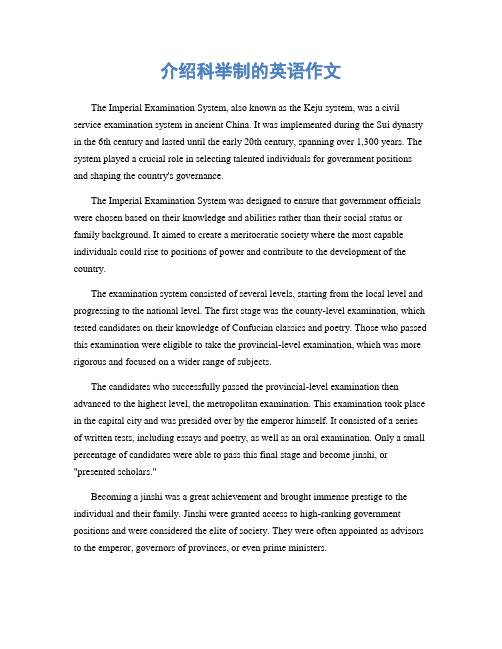
介绍科举制的英语作文The Imperial Examination System, also known as the Keju system, was a civil service examination system in ancient China. It was implemented during the Sui dynasty in the 6th century and lasted until the early 20th century, spanning over 1,300 years. The system played a crucial role in selecting talented individuals for government positions and shaping the country's governance.The Imperial Examination System was designed to ensure that government officials were chosen based on their knowledge and abilities rather than their social status or family background. It aimed to create a meritocratic society where the most capable individuals could rise to positions of power and contribute to the development of the country.The examination system consisted of several levels, starting from the local level and progressing to the national level. The first stage was the county-level examination, which tested candidates on their knowledge of Confucian classics and poetry. Those who passed this examination were eligible to take the provincial-level examination, which was more rigorous and focused on a wider range of subjects.The candidates who successfully passed the provincial-level examination then advanced to the highest level, the metropolitan examination. This examination took place in the capital city and was presided over by the emperor himself. It consisted of a series of written tests, including essays and poetry, as well as an oral examination. Only a small percentage of candidates were able to pass this final stage and become jinshi, or "presented scholars."Becoming a jinshi was a great achievement and brought immense prestige to the individual and their family. Jinshi were granted access to high-ranking government positions and were considered the elite of society. They were often appointed as advisors to the emperor, governors of provinces, or even prime ministers.The Imperial Examination System had a profound impact on Chinese society. It fostered a culture of education and scholarship, as individuals from all social classes aspired to pass the examinations and improve their social status. It also promoted the study of Confucianism and the classics, which became the foundation of Chinese education for centuries.However, the system was not without its flaws. It heavily favored those who had the means to afford a good education and extensive preparation for the examinations. This created a social divide between the wealthy and the poor, as the latter often lacked the resources to compete on an equal footing. Additionally, the emphasis on rote memorization and regurgitation of knowledge limited creativity and critical thinking.The Imperial Examination System finally came to an end in 1905 during the Qing dynasty. The system was criticized for its inability to adapt to the changing needs of a modernizing society and for its role in perpetuating social inequality. It was replaced by a modern education system that focused on a broader range of subjects and encouraged independent thinking.Despite its shortcomings, the Imperial Examination System remains an important part of Chinese history. It shaped the country's governance for over a millennium and left a lasting impact on Chinese culture and education. It serves as a testament to the value placed on education and the pursuit of knowledge in ancient China.。
古代的科举制度英语作文
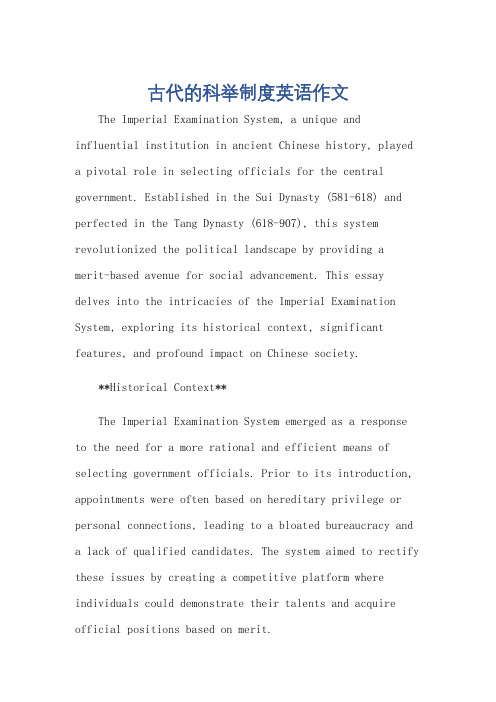
古代的科举制度英语作文The Imperial Examination System, a unique andinfluential institution in ancient Chinese history, played a pivotal role in selecting officials for the central government. Established in the Sui Dynasty (581-618) and perfected in the Tang Dynasty (618-907), this system revolutionized the political landscape by providing amerit-based avenue for social advancement. This essay delves into the intricacies of the Imperial Examination System, exploring its historical context, significant features, and profound impact on Chinese society.**Historical Context**The Imperial Examination System emerged as a response to the need for a more rational and efficient means of selecting government officials. Prior to its introduction, appointments were often based on hereditary privilege or personal connections, leading to a bloated bureaucracy and a lack of qualified candidates. The system aimed to rectify these issues by creating a competitive platform where individuals could demonstrate their talents and acquire official positions based on merit.**Significant Features**1. **Levels of Examinations**: The Imperial Examinations were conducted in three levels: the local-level examination, the provincial-level examination, and the imperial-level examination. Candidates first competed at the local level, passing through successive rounds to reach the provincial level and ultimately the imperial level, where the most elite candidates competed for the highest positions. 2. **Content and Format**: The examinations primarily tested candidates' knowledge of Confucian classics, as well as their literary skills and analytical abilities. The questions were often essay-based, requiring candidates to demonstrate their understanding and interpretation of Confucian thought. 3. **Strict Supervision**: The system was characterized by its strict supervision and rigorous evaluation criteria. Candidates were required to adhere to strict rules during the examinations, and any form of cheating was severely punished. The evaluation process was also highly standardized, with examiners rating candidates based on set criteria.**Profound Impact on Chinese Society**The Imperial Examination System had profound implications for Chinese society. Firstly, it established a meritocratic system of governance, breaking the monopoly of hereditary privilege and opening up opportunities forsocial advancement. This encouraged intellectual pursuits and literary culture, leading to a flourishing of literary and artistic works. Secondly, it fostered a sense of national unity and identity. The shared experience of taking the examinations created a sense of belonging among the educated elite, who identified strongly with the emperor and the central government. Finally, the system also promoted social stability by ensuring the appointment of qualified and loyal officials to key positions within the bureaucracy.In conclusion, the Imperial Examination System was a transformative institution in ancient Chinese history. It revolutionized the political landscape by introducing a merit-based selection process for government officials, fostering intellectual pursuits and literary culture, and promoting social stability and national unity. Itsinfluence extends beyond the confines of ancient China, serving as an inspiration for modern-day selection systems and highlighting the enduring value of meritocracy in society.**中国古代科举制度**中国古代科举制度是一项具有深远影响的制度,它为中央政府选拔官员提供了一种基于才能的途径。
科举制度英语范文

科举制度英语范文The Imperial Examination System, also known as the keju system, was an innovative examination system in ancient China. Developed during the Sui Dynasty (581-618) and fully implemented during the Tang Dynasty (618-907), the system aimed to select and promote talented individuals to serve as officials in the imperial government. Lasting for over a thousand years, the keju system played a significant role in shaping Chinese society and culture.To ensure fairness, the examinations were conducted anonymously. Candidates were identified by a number instead of their name, and their works were judged solely on their merits. This system helped to prevent favoritism and corruption, as it allowed even candidates from humble backgrounds to have a fair chance of success.The keju system helped promote the spread of Confucianism in China. Confucianism emphasized the importance of education and moral integrity in society. The system created a demand for Confucian scholars capable of passing the exams, leading to the establishment of private academies and schools that specialized in Confucian teachings. This in turn contributed to the popularity of Confucianism as the dominant ideology in China for many centuries.。
范进中举——中国古代科举制度中的成功故事
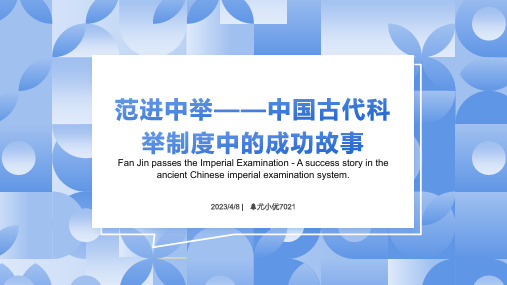
科举制度背景及历史意义
科举制度被誉为中国古代最为重要的选拔人才的制度,它的历 史意义在于促进了士人文化的传承和发展,拉近了不同阶层之 间的距离,推进了社会进步和稳定。的经历和心路历程
人生奋斗的开始
1. 掌握基础知识是成功的基础。范进从小便勤奋好学,刻苦攻读 经书,对诗词歌赋也有深入的研究。他的奋斗之路从学习基础开 始,持之以恒地打牢基础,为日后的发展积累了雄厚的素质。
主题:范进中举
范进智勇双全
1.范进具有深厚的家族背景及丰富的实践经验,如他曾经在一家丝绸绸厂当过工人,积累 了大量生产管理和商业经验。
2.范进勇于探究考试规律,在日复一日的刻苦复习中总结经验,通过不断调整学习方法和 策略,最终在科举考试中一举中举。 3.范进有顽强的毅力和不屈不挠的精神,如他曾经因妻子生了病而停止学业,但他依然没 有放弃,最终在照顾妻子的同时重新回到书本前,不懈努力,最终取得了成功。
范进通过考试
原因可能有多种,其中一方面可能是他良好的家风和教育背景。据《红楼梦》中描述, 范家是南京著名的文学世家,其祖上曾有多位文坛巨匠。范家又有“金玉双教”的美誉 ,指的是范氏夫妇都是才貌双全的人才,能够给予范进优秀的家庭教育。因此,范进在 儒家经典、古文诗词等方面都接受了相对较高水平的教育,这在一定程度上为他日后的 考试打下了良好的基础。
勤奋努力,终得中举
2023.01.01
THANKS
2023/4/8 | MGT
2. 不断突破自我,挑战自己的极限。范进在争取中举的过程中, 屡屡受挫,但他不放弃,不断反思自己的不足,积极寻求改进。 他从不断失败中吸取经验,勇敢地面对挫折,最终成功中举。
3. 有恒心、有毅力才能走向成功。范进在学习和考试的过程中经 历了许多的波折,但他始终保持着恒心和毅力。他深知成功需要 付出努力和耐心,不轻言放弃,终于成功地中举。他的故事告诉 我们,只有坚定不移地走下去,才能取得最终的成功。
古代科举制度
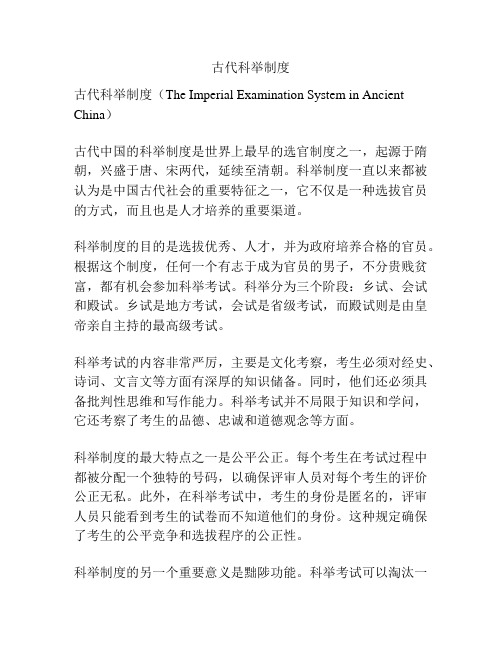
古代科举制度古代科举制度(The Imperial Examination System in Ancient China)古代中国的科举制度是世界上最早的选官制度之一,起源于隋朝,兴盛于唐、宋两代,延续至清朝。
科举制度一直以来都被认为是中国古代社会的重要特征之一,它不仅是一种选拔官员的方式,而且也是人才培养的重要渠道。
科举制度的目的是选拔优秀、人才,并为政府培养合格的官员。
根据这个制度,任何一个有志于成为官员的男子,不分贵贱贫富,都有机会参加科举考试。
科举分为三个阶段:乡试、会试和殿试。
乡试是地方考试,会试是省级考试,而殿试则是由皇帝亲自主持的最高级考试。
科举考试的内容非常严厉,主要是文化考察,考生必须对经史、诗词、文言文等方面有深厚的知识储备。
同时,他们还必须具备批判性思维和写作能力。
科举考试并不局限于知识和学问,它还考察了考生的品德、忠诚和道德观念等方面。
科举制度的最大特点之一是公平公正。
每个考生在考试过程中都被分配一个独特的号码,以确保评审人员对每个考生的评价公正无私。
此外,在科举考试中,考生的身份是匿名的,评审人员只能看到考生的试卷而不知道他们的身份。
这种规定确保了考生的公平竞争和选拔程序的公正性。
科举制度的另一个重要意义是黜陟功能。
科举考试可以淘汰一些不称职或无能的考生,同时也可以提拔一些才华横溢、有能力的考生进入政府机构。
通过科举考试选拔的官员被认为是最合适的人选,由于他们具备了合格的知识和道德观念,所以他们在政府工作岗位上表现出色并能够为国家做出更大的贡献。
科举制度也有一些问题和争议。
一方面,科举制度过于注重书本知识,对于实际能力缺乏考察,这可能导致一些选出来的官员在实践中不够出色。
另一方面,科举制度也对农民和贫穷家庭的孩子来说不太公平。
由于他们没有机会接受高等教育,他们的学问储备和机会被剥夺。
因此,科举制度也受到了一些批评。
尽管存在一些争议,科举制度在中国的政府选官制度中起到了重要作用。
古代的科举制度英语作文
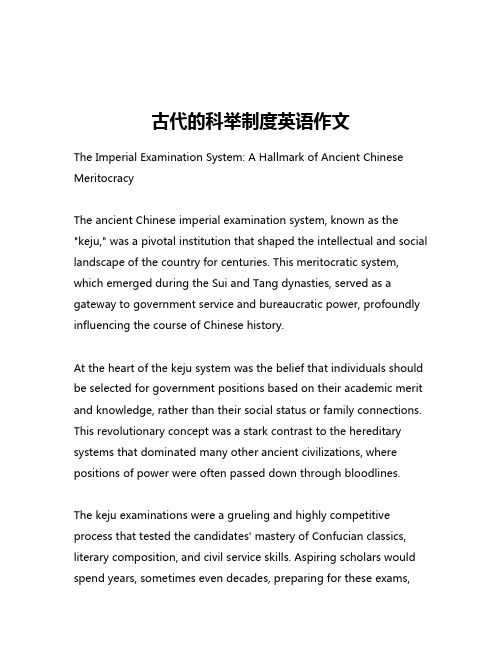
古代的科举制度英语作文The Imperial Examination System: A Hallmark of Ancient Chinese MeritocracyThe ancient Chinese imperial examination system, known as the "keju," was a pivotal institution that shaped the intellectual and social landscape of the country for centuries. This meritocratic system, which emerged during the Sui and Tang dynasties, served as a gateway to government service and bureaucratic power, profoundly influencing the course of Chinese history.At the heart of the keju system was the belief that individuals should be selected for government positions based on their academic merit and knowledge, rather than their social status or family connections. This revolutionary concept was a stark contrast to the hereditary systems that dominated many other ancient civilizations, where positions of power were often passed down through bloodlines.The keju examinations were a grueling and highly competitive process that tested the candidates' mastery of Confucian classics, literary composition, and civil service skills. Aspiring scholars would spend years, sometimes even decades, preparing for these exams,which were held at the county, provincial, and imperial levels. The successful candidates, known as "jinshi," were then granted prestigious government positions, often serving as high-ranking officials, scholars, and advisors to the imperial court.The impact of the keju system on Chinese society was far-reaching. By providing a pathway to power and influence for individuals from diverse backgrounds, the system helped to foster a culture of intellectual pursuit and social mobility. Families across the country invested heavily in their children's education, hoping to produce the next generation of scholars and bureaucrats.Moreover, the keju system played a crucial role in shaping the intellectual landscape of China. The emphasis on Confucian classics and literary composition encouraged the preservation and dissemination of traditional Chinese knowledge and culture. Scholars who excelled in the examinations often became influential thinkers and writers, contributing to the rich tapestry of Chinese philosophy, literature, and the arts.However, the keju system was not without its flaws and criticisms. Over time, the system became increasingly rigid and bureaucratic, with the examinations focusing more on rote memorization and test-taking skills rather than true intellectual inquiry. Additionally, the system was often criticized for its exclusion of certain social groups,such as women and the lower classes, who faced significant barriers to participation.Despite these challenges, the keju system remained a cornerstone of Chinese governance for over a millennium, until its eventual abolition in the early 20th century. Its legacy, however, continues to shape the cultural and intellectual traditions of China, serving as a testament to the power of meritocracy and the enduring human desire for social mobility and recognition.In conclusion, the ancient Chinese imperial examination system was a remarkable institution that exemplified the country's commitment to meritocracy and the pursuit of knowledge. Its impact on Chinese history, society, and culture is undeniable, and it continues to be a subject of fascination and scholarly inquiry to this day.。
科举制度的英语
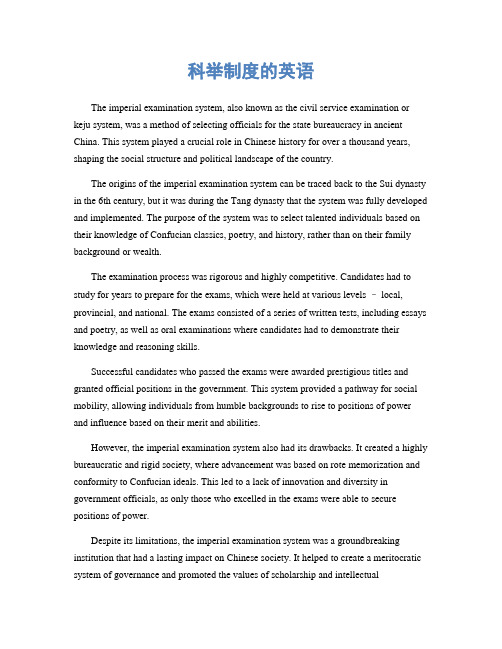
科举制度的英语The imperial examination system, also known as the civil service examination or keju system, was a method of selecting officials for the state bureaucracy in ancient China. This system played a crucial role in Chinese history for over a thousand years, shaping the social structure and political landscape of the country.The origins of the imperial examination system can be traced back to the Sui dynasty in the 6th century, but it was during the Tang dynasty that the system was fully developed and implemented. The purpose of the system was to select talented individuals based on their knowledge of Confucian classics, poetry, and history, rather than on their family background or wealth.The examination process was rigorous and highly competitive. Candidates had to study for years to prepare for the exams, which were held at various levels – local, provincial, and national. The exams consisted of a series of written tests, including essays and poetry, as well as oral examinations where candidates had to demonstrate their knowledge and reasoning skills.Successful candidates who passed the exams were awarded prestigious titles and granted official positions in the government. This system provided a pathway for social mobility, allowing individuals from humble backgrounds to rise to positions of power and influence based on their merit and abilities.However, the imperial examination system also had its drawbacks. It created a highly bureaucratic and rigid society, where advancement was based on rote memorization and conformity to Confucian ideals. This led to a lack of innovation and diversity in government officials, as only those who excelled in the exams were able to secure positions of power.Despite its limitations, the imperial examination system was a groundbreaking institution that had a lasting impact on Chinese society. It helped to create a meritocratic system of governance and promoted the values of scholarship and intellectualachievement. The system was eventually abolished in the early 20th century as part of the modernization efforts of the Qing dynasty.In conclusion, the imperial examination system was a unique and influential institution in Chinese history. It served as a means of selecting talented individuals for government service and played a significant role in shaping the social and political landscape of ancient China. While it had its flaws, the system was an important step towards establishing a merit-based system of governance and promoting the values of education and intellectual achievement.。
- 1、下载文档前请自行甄别文档内容的完整性,平台不提供额外的编辑、内容补充、找答案等附加服务。
- 2、"仅部分预览"的文档,不可在线预览部分如存在完整性等问题,可反馈申请退款(可完整预览的文档不适用该条件!)。
- 3、如文档侵犯您的权益,请联系客服反馈,我们会尽快为您处理(人工客服工作时间:9:00-18:30)。
Juren The Provincial Examination
省试
Xiucai
The County Examination 乡试
Tongsheng
Zhuangyuan
Bangyan
Tanhua
Jinshi
Jinshi
Influence Advantages
• To the government • To the administrative officials • To the grassroots
Emperor Taizong
The Four BookS
The Great Learning The Doctrine of the Mean The Analects of Confucius Mencius
the Five Classics
Eight – legged essay
→ → Opening
Disadvantages
• Imprison people’ thoughts
十年寒窗无人问, Ten—year hard study by the window, industrious 一举成名天下知。 One—day success known to the world, glorious!
• 隋朝以后,国家逐渐确立以科举考试选拔 官员,私学开始衰败,调整为以应举(科 举考试)为目的。
Origin ※ To replace the Nine Rank Judging
System (九品中正制) ※ To select real talents
Emperor Yang of Sui
Emperor Xuanzong
The Imperial Examination System
中国科举制度
Imperial Examination System 科举考试制度
• After the Sui Dynasty, these private and official schools had gradually deteriorated (衰败) into a dependency on the imperial examination system (科 举考试制度), through which officials were selected.
Amplification
破题
承题
→ Initial argument 起股
Central argument 中股
→ → Latter argument 后股
Final argument 束股
ConcluLeabharlann ion 大结LevelsJinshi The Palace Examination殿试
Gongshi The Academy Examination
